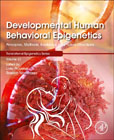
Developmental Human Behavioral Epigenetics: Principles, Methods, Evidence, and Future Directions
Provenzi, Livio
Montirosso, Rosario
Tollefsbol, Trygve
Accumulating evidence suggests that environmentally-driven epigenetic regulation contributes to developmental phenotypes in humans. The panorama of human behavioral epigenetics research includes gene expression correlates of different environmental exposures, such as early-life adversities and protective care conditions. Developmental Human Behavioral Epigenetics, a new volume in the Translational Epigenetics series, offers the first systematic account of theoretical frameworks, methodological approaches, findings, and future directions in the field of human behavioral epigenetics. Featuring contributions from leading scientists and international researchers, this book provides a comprehensive overview of human behavioral epigenetics, with a close examination of evidence gathered to-date from animal models, challenges of human-based research and clinical translation, pathways towards drug discovery, and next steps in research. Areas of focus include prenatal stress exposures, preterm behavioral epigenetics, intergenerational exposures, trauma and neglect, socio-economic conditions, maternal caregiving and attachment, study design, and epigenetics and psychotherapy. Offering an interdisciplinary, scientifically rigorous but socially aware treatment, the book illuminates the molecular basis and implications of epigenetic mechanisms behind behavioral phenotypes, providing tools for population-based studies, and defining ethical pathways towards application in behavioral medicine. Enables more effective study design and methods application in behavioral epigenetics research across human and animal modelsExamines findings in human behavioral epigenetics to-date, organized by developmental periods and exposure typeFeatures contributions from leading international researchers in behavioral epigenetics INDICE: Section 1: Theoretical background 1. Epigenetic principles 2. A rat story: pioneering work on animal models 3. Human behavioural epigenetics 4. Implications for research and clinical practice Section 2: Methodological issues 5. How to measure epigenetic signatures? 6. Specific challenges of HBE 7. Study design in HBE Section 3: Findings and application areas - Adversities 8. Prenatal stress exposures 9. Preterm Behavioral Epigenetics 10. Trauma, abuse, neglect 11. Socio-economic conditions 12. Wide-range disasters 13. Intergenerational exposures and transmissions Section 4 - Findings and application areas - Protective care 14. An under-investigated still clinically relevant area of HBE research 15. Promotion of neonatal care 16. The role of maternal caregiving and attachment 17. Epigenetics and psychotherapy Section 5: Open questions and future directions 18. The road made so far 20. What's next?
- ISBN: 978-0-12-819262-7
- Editorial: Academic Press
- Encuadernacion: Rústica
- Páginas: 392
- Fecha Publicación: 01/11/2020
- Nº Volúmenes: 1
- Idioma: Inglés
